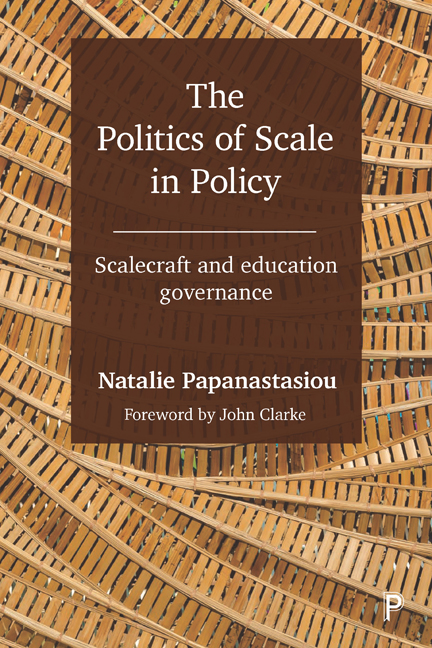Book contents
- Frontmatter
- Contents
- About the author
- Foreword
- Preface and acknowledgements
- 1 Policy, scale and the importance of space
- 2 Problematising scale in the study of policy
- 3 Exposing scale hegemonies
- 4 Knowledge, policy and scale
- 5 Hegemonies of statecraft and scale
- 6 Spatial entrepreneurs and scalecraft
- 7 The practice of scalecraft
- References
- Index
6 - Spatial entrepreneurs and scalecraft
Published online by Cambridge University Press: 27 April 2022
- Frontmatter
- Contents
- About the author
- Foreword
- Preface and acknowledgements
- 1 Policy, scale and the importance of space
- 2 Problematising scale in the study of policy
- 3 Exposing scale hegemonies
- 4 Knowledge, policy and scale
- 5 Hegemonies of statecraft and scale
- 6 Spatial entrepreneurs and scalecraft
- 7 The practice of scalecraft
- References
- Index
Summary
Acts of normative improvisation by forgotten street wise workers sustain the state: they are acts of statecraft on which the institutions of governing depend. (Maynard-Moody and Musheno, 2003, 165)
This chapter focuses on the practices of frontline workers in policymaking processes. Instead of understanding frontline work as a discrete stage of the policy cycle which is separate to the formulation of policy, the discussion understands it to be a core practice in the making and re-making of policy, and one which brings to the fore the complex interplay between a number of processes which include discretion, interpretation and statecraft. The chapter makes a key intervention in the literature by arguing that practices of scalecraft are an overlooked dimension of frontline work. It breaks new ground by exploring how frontline workers construct and strategically mobilise scale in their policy work, and by questioning what this can reveal about the skills and practices of policymaking.
Questions around the importance of frontline work originate in a classic debate that took central stage in the field of policy analysis during the 1980s and 1990s, which was the stand-off between scholars advocating ‘top-down’ approaches to studying implementation and those supporting ‘bottom-up’ approaches (Hill and Hupe, 2002). Top-down approaches broadly approach implementation as ‘the hierarchical execution of centrally-defined policy intentions’ (Pülzl and Treib, 2007, 89) whereas bottom-up approaches study implementation from the perspective of street-level actors tasked with implementing government policies.
Reflecting on this debate, Susan Barrett (2004) identifies that it rests on two crucial questions. The first question is, ‘What are implementation studies trying to do?’ Top-down approaches would argue that the aim of policy analysis is to be prescriptive and assist in closing the gap between policymakers’ goals and the outcomes of policy on the ground by identifying key conditions that need to be put in place to achieve this. Scholars advocating a bottom- up approach on the other hand would argue that the main aim of studying implementation is to understand the complexities involved in the work of policy actors, particularly those working at the frontline.
- Type
- Chapter
- Information
- The Politics of Scale in PolicyScalecraft and Education Governance, pp. 89 - 106Publisher: Bristol University PressPrint publication year: 2019



